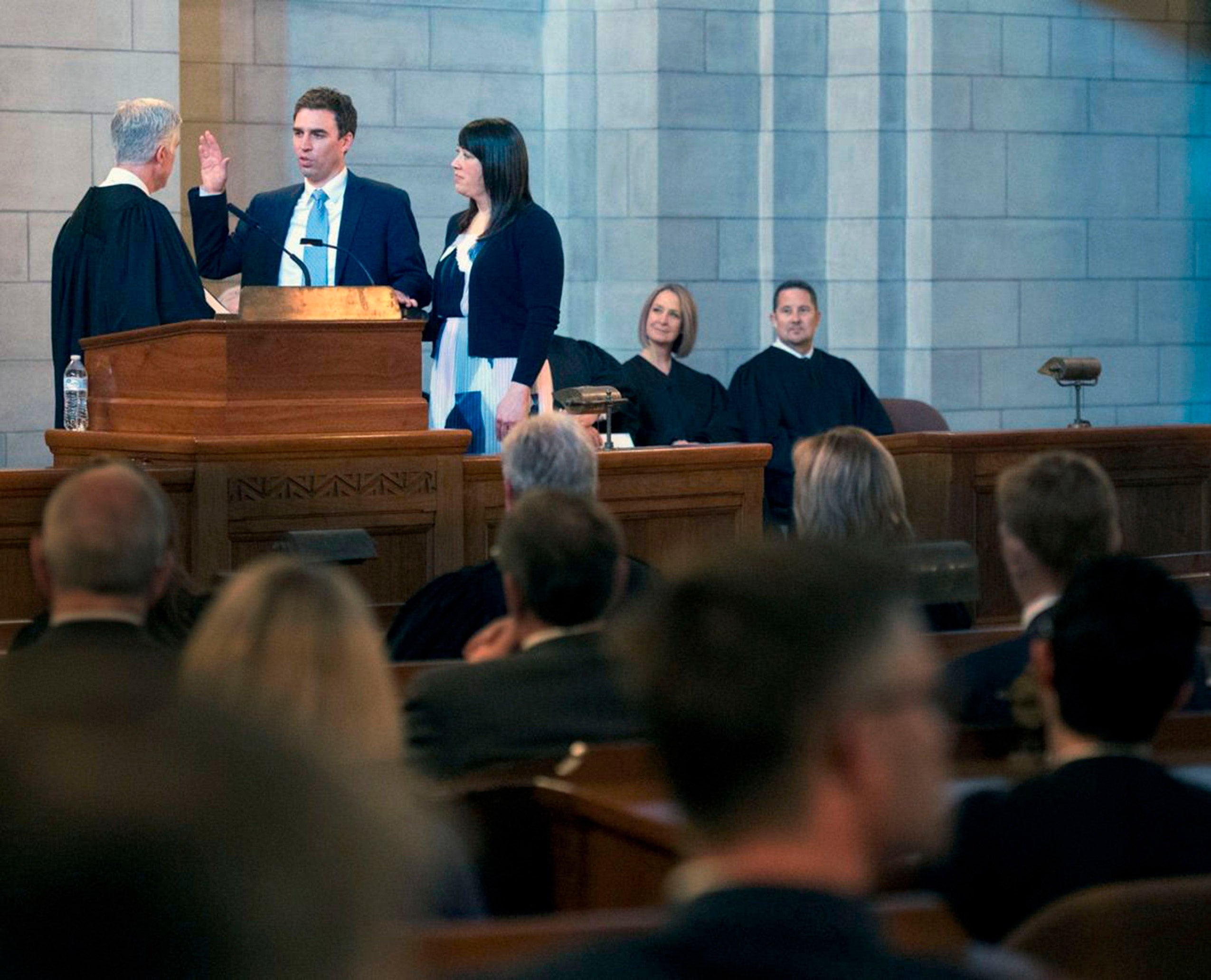As an attorney at Cline Williams Wright Johnson & Oldfather in Omaha, Nebraska, Jonathan Papik ’08 argued several times before the Nebraska Supreme Court, most recently in December 2017. The case was decided in his favor the next spring. Shortly afterward, he found out that it would most likely be his final argument before that court. His work was not done with the court, however. In fact, it had only just begun — from the other side of the bench.
In May 2018, Papik was sworn in as a justice on the highest court of his home state by U.S. Supreme Court Justice Neil Gorsuch ’91, for whom he’d served as a clerk when Gorsuch was on the U.S. Court of Appeals for the 10th Circuit. Appointed by Nebraska Gov. Pete Ricketts, Papik became, at age 36, the youngest justice in the history of the Nebraska Supreme Court. At the investiture ceremony, Gorsuch outlined the essential qualities of a judge according to the Greek philosopher Socrates. He noted that some people take many years to achieve the Socratic standard and others just have it. “I am pleased to report,” he said, “that Jonathan Papik just has it.”
Papik considered whether he should apply for the position (in Nebraska, people apply for open state court seats to a judicial nominating commission, which recommends finalists to the governor) at a relatively early stage of his career and after he became partner at his firm. He was swayed by the knowledge that seats on the court, which in Nebraska are assigned by geographic districts, aren’t often available, and by his feeling that he had something he wanted to contribute to the job.
His colleagues on the court helped ease his transition into the position and greeted him as an equal, he says, despite his lack of judicial experience. (The only time he’s aware of being the youngest judge on the court, he jokes, is when a fellow judge occasionally has to explain an older movie or musical reference to him.) He enjoys the independence of the judicial role as well as learning about areas of the law that he hadn’t worked on before in his legal practice.
“I love legal analysis,” he said. “I’ve been fascinated with it since law school, and there aren’t a lot of jobs where your only job is to figure out what the law is and apply it to the facts without anybody from the outside pressuring you to take a certain position or view it in a certain way.”
Papik became interested in serving as an appellate judge because of his experiences clerking for Gorsuch and U.S. Court of Appeals Judge Laurence Silberman ’61. He admired their devotion to every case and their commitment to apply the law regardless of their personal opinions. “The law is something that is outside of my own personal feelings on what social policy should be or what the outcome of a particular case should be,” Papik said. “It’s not what I think the Constitution ought to be, but what did the people adopt.”
“The law is something that is outside of my own personal feelings on what social policy should be or what the outcome of a particular case should be.”
His interest in the work of the Supreme Court — along with the example of his father, who still practices as an attorney in Papik’s hometown of Stromsburg, Nebraska — inspired him to go to law school. He appreciated the diverse backgrounds of the student body at HLS and praised the faculty for “being engaging and introducing you to the law but also how to think about the law.” Although he considered job opportunities in the larger legal markets that many of his classmates went to, he ultimately decided to return to his home state. Papik and his wife, Rachel, who is from Minnesota, had the first of their three children when he was clerking for Silberman, and they wanted to be nearer to family. There’s a benefit to practicing law close to home, he says, including a familiarity with local culture and customs and businesses. Plus, he expected that a smaller market might give him more opportunities for meaningful work sooner than if he went elsewhere. As it turned out, he was sworn in as a justice on his home state’s highest court almost exactly 10 years after he graduated from Harvard Law School.
